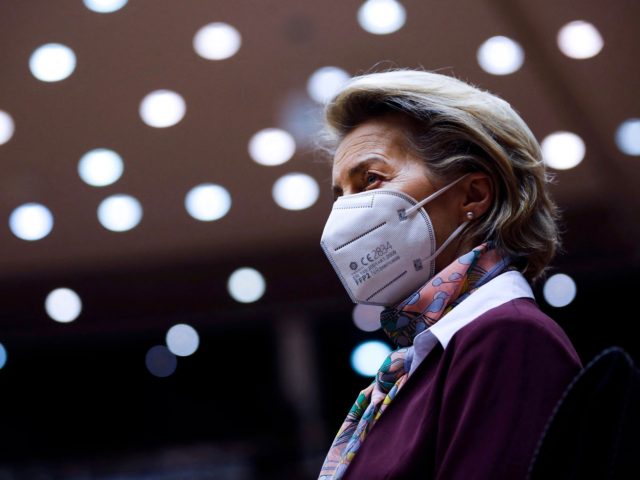The European Union has threatened to blockade more supplies of coronavirus vaccines — while accusing others of doing the same — as the bloc continues to fall behind other major western powers in its ability to roll out the jab.
President of the EU Commission Ursula von der Leyen said that the Italian government’s ban on vaccine exports to Australia “was not a one-off”.
Ms von der Leyen blamed the pharmaceutical giant AstraZeneca for the low number of vaccinations in the bloc, claiming per DW that the firm had “delivered less than 10% of the amount ordered by the EU for the period from December to March.”
Commission sources told the German public broadcaster that they would not be disclosing which countries may blockade vaccine supplies next, as it would supposedly violate “corporate confidentiality”.
The EU Commission president initially tried cast blame upon Brexit Britain as well as the pharma companies. Yet, it was later revealed that the relatively slow delivery of the vaccine came as a result of the EU waiting three months after the UK to sign contracts for the vaccine.
Brussels has further intensified its diplomatic spat with London by attempting to turn the tables on the negative press around their vaccine export ban, claiming that the United Kingdom had issued its own “imposed an outright ban on the export of vaccines”. The United Kingdom outright denied the claim, with foreign secretary Dominic Raab writing to European Council President Charles Michel, and an EU ambassador being summoned in London.
Mr Raab called the EU’s claims about Britain withholding vaccines “completely false”. German broadcaster DW reported EU-UK relations had hit a new low over Michel’s claims.
The EU’s failures have been widely panned across Europe, with one German editor describing Brussels’ vaccine roll out as the “biggest confidence-destroying programme” in the history of the EU.
Last week, Brussels backed a request from the Italian government to halt the export of 250,000 doses of the AstraZeneca vaccine to Australia, amid the “continuing shortage of vaccines in the EU and in Italy and delays in supplies from AstraZeneca to the EU and Italy.”
The move was also backed by Emmanuel Macron’s government in France, with health minister Olivier Veran saying France could “do the same” like Italy and block exports.
The European Union’s vaccine fiasco also seen the bloc request that U.S. President Joe Biden loosen restrictions on vaccine supplies to prop up EU supplies.
Aussie Govt: Desperate EU ‘Tearing Up Rule Book’ by Blocking Vaccine Shipment https://t.co/zso9WNBcEg
— Breitbart London (@BreitbartLondon) March 5, 2021
The European Union’s bungled response to the coronavirus has come with increasing economic costs, particularly when contrasted with the recently independent United Kingdom, which at one point last month had vaccinated more people than the entire 27-country bloc.
According to analysis from the Organisation for Economic Co-operation and Development (OECD), the economy of the eurozone fell by .7 per cent in the last quarter of 2020, signalling that the possibility of a double-dip recession. During the same time period, the UK grew by 1 per cent.
The report said that it expects a “more gradual” recovery from the EU in comparison to the UK, whose more accelerated vaccine push “should help momentum to build”.
The OECD projected that the eurozone will grow by 3.9 per cent this year, pailing in comparison to the 5.1 per cent growth expected from the UK during its first year of official independence from the EU.
“Slow progress in vaccine rollout and the emergence of new virus mutations resistant to existing vaccines would result in a weaker recovery, larger job losses and more business failures,” the think tank said.
Farage: “If this crisis has taught us anything, it is that the best decisions are taken by national governments acting in their national interest. It is for this reason that I say Europe must leave the European Union." https://t.co/PKDYxVxKAK
— Breitbart London (@BreitbartLondon) January 29, 2021
Follow Kurt Zindulka on Twitter here @KurtZindulka

COMMENTS
Please let us know if you're having issues with commenting.